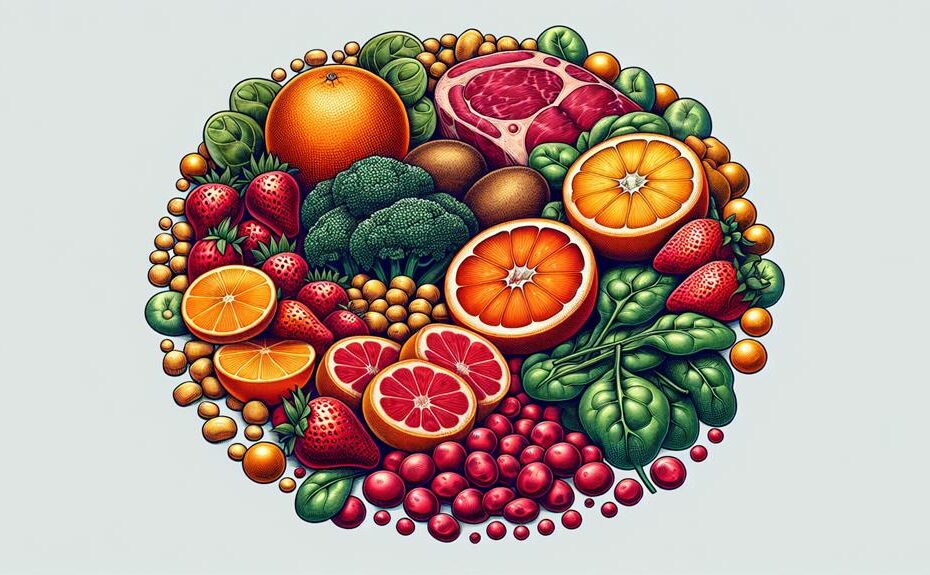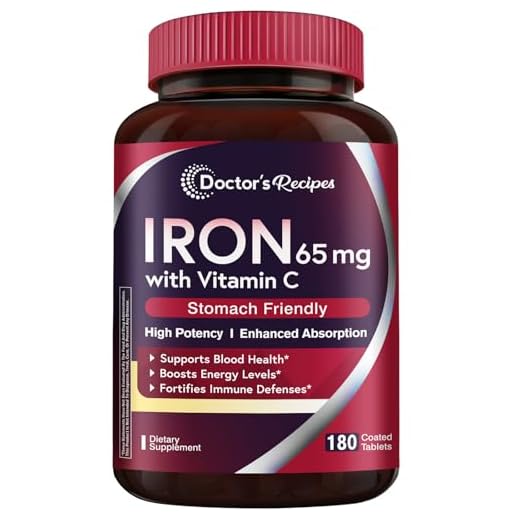







Vitamin C boosts iron absorption in your body. It helps convert iron into a more absorbable form. Eating foods rich in both vitamin C and iron enhances absorption. Vitamin C's antioxidants play an essential role in this process. Factors like tannins may inhibit iron absorption. You can optimize iron absorption by balancing your diet smartly. This interaction between these nutrients is important for your health. Learn more about how vitamin C and iron work together to benefit your body's well-being.
Key Takeaways
- Vitamin C enhances iron absorption by converting non-heme iron into a more absorbable form.
- Consuming Vitamin C-rich foods alongside iron-rich foods improves iron uptake efficiency.
- Vitamin C's antioxidant properties aid in protecting iron from oxidation, enhancing absorption.
- Vitamin C reduces inhibitors like tannins and phytates, improving bioavailability of iron.
- Nutrient synergy between Vitamin C and iron optimizes overall nutrient uptake for better health.
The Importance of Vitamin C
Understanding the essential role that Vitamin C plays in enhancing iron absorption is important for maintaining peak health and preventing deficiencies. Vitamin C is not only renowned for its antioxidant properties but also for its critical role in supporting the immune system. As an antioxidant, Vitamin C helps protect cells from damage caused by free radicals, which are unstable molecules that can harm the body if left unchecked. Additionally, Vitamin C aids in the regeneration of other antioxidants in the body, further boosting its protective effects.
When it comes to immune support, Vitamin C is a key player in enhancing the function of various immune cells, such as phagocytes and T-cells, which help combat infections and keep the body healthy. Also, Vitamin C promotes the production of collagen, a protein essential for wound healing and maintaining the integrity of skin, bones, and blood vessels. Ensuring an adequate intake of Vitamin C is crucial for overall well-being and optimizing the body's ability to absorb and utilize iron effectively.
Enhancing Iron Absorption
To optimize the absorption of iron, it is essential to take into account the factors that influence this process, including the role of Vitamin C in enhancing iron uptake. Dietary strategies play a significant role in improving iron absorption. Consuming Vitamin C-rich foods, such as citrus fruits, bell peppers, and strawberries, alongside iron-rich foods like spinach, red meat, and lentils can enhance the body's ability to absorb iron efficiently. Vitamin C helps convert non-heme iron, the type found in plant-based foods and supplements, into a more absorbable form, increasing the overall bioavailability of iron.
Bioavailability factors also play an important role in iron absorption. Factors such as tannins in tea, calcium from dairy products, and phytates in whole grains can inhibit iron absorption. It is advisable to avoid consuming these inhibitors at the same time as iron-rich foods. By incorporating dietary strategies that enhance iron absorption and being mindful of bioavailability factors, you can optimize your body's ability to absorb this essential mineral effectively.
Vitamin C and Iron Interaction
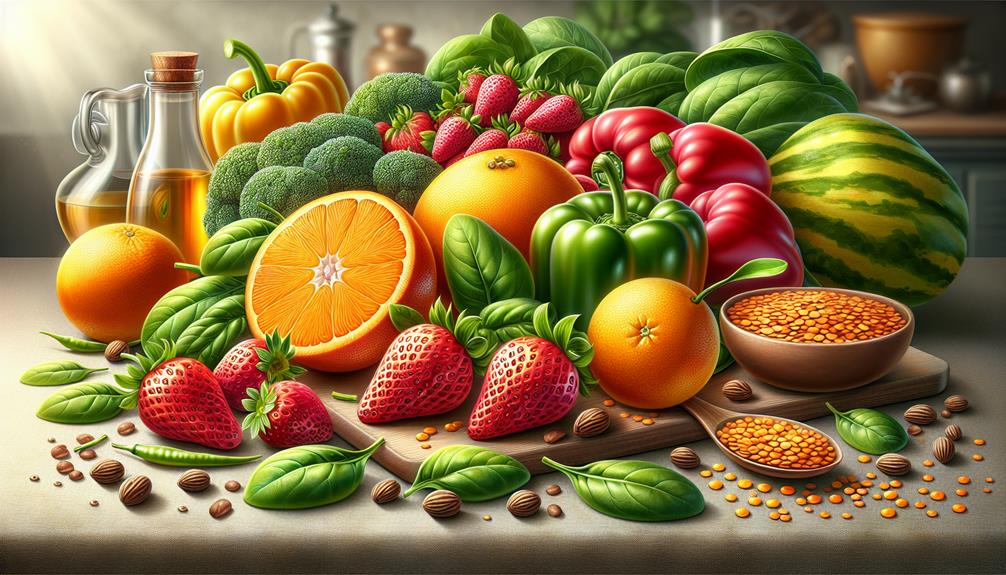
Investigating the dynamic relationship between Vitamin C and iron reveals an essential interplay that greatly influences nutrient absorption in the body. Vitamin C and iron exhibit a dietary synergy, working together to enhance the bioavailability of iron. The antioxidant properties of Vitamin C play a pivotal role in this interaction. Iron, particularly non-heme iron found in plant-based foods, is not as efficiently absorbed by the body as heme iron from animal sources. However, when Vitamin C is consumed alongside non-heme iron sources, it forms a complex that is more easily absorbed by the intestines. This enhancement in bioavailability is key for individuals, especially vegetarians or those with low iron stores, to maximize iron absorption from their diets. The absorption mechanisms involved in this process are intricate, highlighting the intricate ways in which different nutrients interact within the body to optimize nutrient uptake for overall health and well-being.
Mechanisms of Nutrient Uptake
The mechanisms governing nutrient uptake in the body involve a complex interplay of various processes and factors that ultimately determine the efficiency of absorption and utilization of essential nutrients. When it comes to the absorption of nutrients like iron and vitamin C, transport mechanisms play a pivotal role. For instance, in the case of iron absorption, specialized transporters in the small intestine, such as divalent metal transporter 1 (DMT1), facilitate the uptake of dietary iron into intestinal cells. Once inside these cells, iron can either be stored as ferritin or transported out into the bloodstream by ferroportin for systemic use. On the other hand, vitamin C enhances iron absorption by reducing dietary iron (Fe3+) to a more absorbable form (Fe2+) and forming a complex that is more easily absorbed by the body. This highlights the intricate relationship between nutrient transport mechanisms and cellular uptake, showcasing how different nutrients work together to ensure optimal absorption and utilization within the body.
Optimal Utilization in the Body
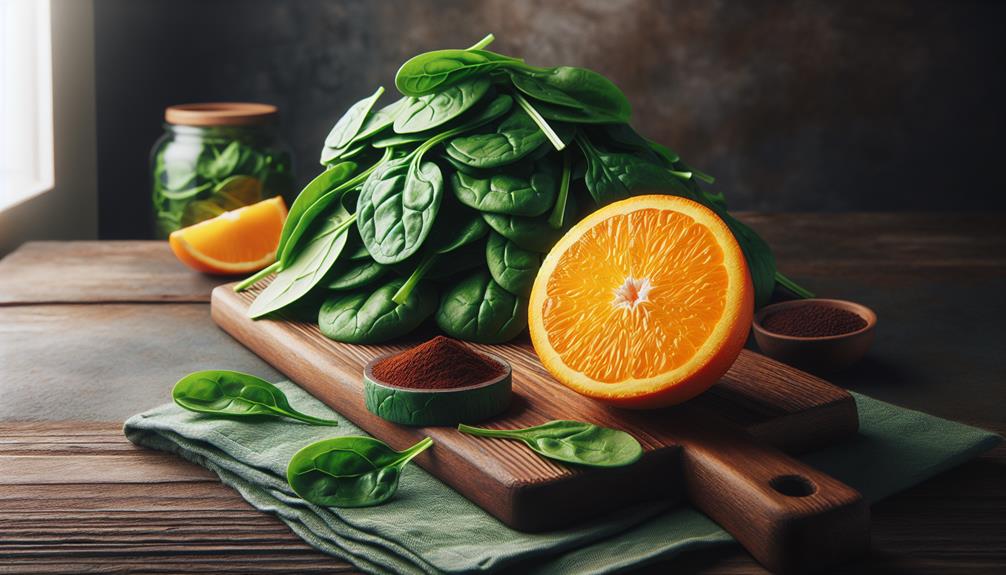
In considering the interplay between nutrient transport mechanisms and cellular uptake, understanding how the body effectively utilizes essential nutrients like iron and vitamin C is important for maintaining overall health and well-being. Vitamin C plays a critical role in enhancing iron absorption efficiency through a process known as nutrient synergy. When consumed together, vitamin C helps to convert iron into a more soluble form that is easier for the body to absorb. This interaction highlights the significance of incorporating vitamin C-rich foods, such as citrus fruits, bell peppers, and strawberries, into iron-rich meals like lean meats, beans, and fortified cereals to maximize nutrient utilization.
Furthermore, the efficient utilization of iron and vitamin C in the body relies on various factors such as the body's current iron stores, overall health status, and individual metabolic differences. By ensuring a balanced diet that includes these essential nutrients and promotes nutrient synergy, you can support the body's ability to absorb and utilize iron effectively, ultimately contributing to improved overall health and well-being.
Scientific Insights on Absorption
Examining the intricate mechanisms of nutrient absorption reveals key insights into the interplay between vitamin C and iron within the body. When you consume foods rich in iron alongside vitamin C, such as spinach and oranges, the absorption of iron is notably enhanced. This is due to the role of vitamin C in promoting iron uptake in the intestines. Vitamin C acts as a facilitator in the process of nutrient transport across the intestinal barrier, allowing for better absorption of iron into the bloodstream.
At a cellular level, vitamin C helps convert iron into a more absorbable form, aiding in its cellular uptake. Research suggests that vitamin C may also prevent the formation of insoluble iron compounds, further improving iron absorption efficiency. Understanding these mechanisms sheds light on the importance of consuming vitamin C-rich foods in conjunction with iron sources to optimize iron absorption. By supporting nutrient transport and enhancing cellular uptake, vitamin C plays an essential role in ensuring adequate iron levels in the body.
Benefits for Overall Health
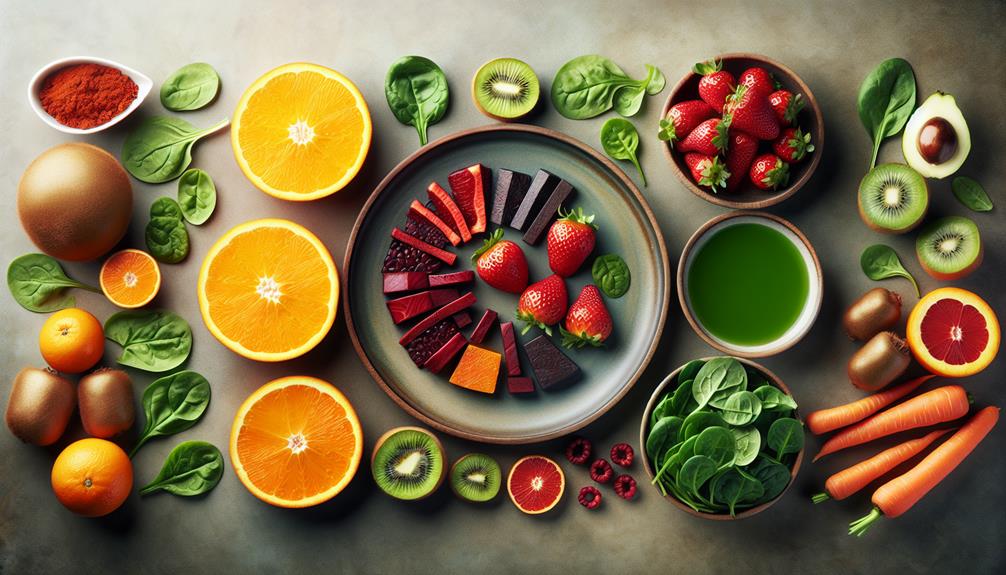
Understanding how vitamin C enhances iron absorption can offer a multitude of benefits for your overall health. Vitamin C plays an essential role in supporting your immune system. By aiding the absorption of iron, vitamin C helps in the production of hemoglobin, which is vital for transporting oxygen throughout your body. This, in turn, can enhance your immune response, making you better equipped to fight off infections and illnesses.
Moreover, vitamin C is renowned for its benefits in promoting skin health. Collagen, a protein that provides structure to your skin, relies on vitamin C for its synthesis. Improved iron absorption due to vitamin C can lead to better collagen production, helping to maintain skin elasticity and strength. Additionally, vitamin C's antioxidant properties protect the skin from damage caused by free radicals, which can contribute to premature aging.
Incorporating vitamin C-rich foods in your diet not only boosts iron absorption but also supports your immune system and promotes healthy, glowing skin.
